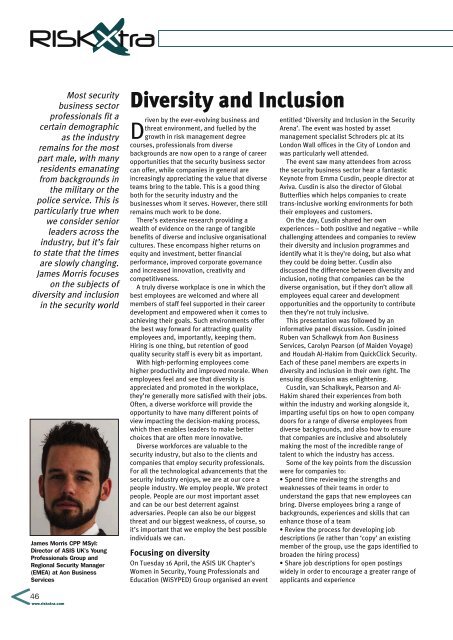RiskXtraJune2019
You also want an ePaper? Increase the reach of your titles
YUMPU automatically turns print PDFs into web optimized ePapers that Google loves.
x<br />
RISKXtra<br />
Most security<br />
business sector<br />
professionals fit a<br />
certain demographic<br />
as the industry<br />
remains for the most<br />
part male, with many<br />
residents emanating<br />
from backgrounds in<br />
the military or the<br />
police service. This is<br />
particularly true when<br />
we consider senior<br />
leaders across the<br />
industry, but it’s fair<br />
to state that the times<br />
are slowly changing.<br />
James Morris focuses<br />
on the subjects of<br />
diversity and inclusion<br />
in the security world<br />
James Morris CPP MSyI:<br />
Director of ASIS UK’s Young<br />
Professionals Group and<br />
Regional Security Manager<br />
(EMEA) at Aon Business<br />
Services<br />
Diversity and Inclusion<br />
Driven by the ever-evolving business and<br />
threat environment, and fuelled by the<br />
growth in risk management degree<br />
courses, professionals from diverse<br />
backgrounds are now open to a range of career<br />
opportunities that the security business sector<br />
can offer, while companies in general are<br />
increasingly appreciating the value that diverse<br />
teams bring to the table. This is a good thing<br />
both for the security industry and the<br />
businesses whom it serves. However, there still<br />
remains much work to be done.<br />
There’s extensive research providing a<br />
wealth of evidence on the range of tangible<br />
benefits of diverse and inclusive organisational<br />
cultures. These encompass higher returns on<br />
equity and investment, better financial<br />
performance, improved corporate governance<br />
and increased innovation, creativity and<br />
competitiveness.<br />
A truly diverse workplace is one in which the<br />
best employees are welcomed and where all<br />
members of staff feel supported in their career<br />
development and empowered when it comes to<br />
achieving their goals. Such environments offer<br />
the best way forward for attracting quality<br />
employees and, importantly, keeping them.<br />
Hiring is one thing, but retention of good<br />
quality security staff is every bit as important.<br />
With high-performing employees come<br />
higher productivity and improved morale. When<br />
employees feel and see that diversity is<br />
appreciated and promoted in the workplace,<br />
they’re generally more satisfied with their jobs.<br />
Often, a diverse workforce will provide the<br />
opportunity to have many different points of<br />
view impacting the decision-making process,<br />
which then enables leaders to make better<br />
choices that are often more innovative.<br />
Diverse workforces are valuable to the<br />
security industry, but also to the clients and<br />
companies that employ security professionals.<br />
For all the technological advancements that the<br />
security industry enjoys, we are at our core a<br />
people industry. We employ people. We protect<br />
people. People are our most important asset<br />
and can be our best deterrent against<br />
adversaries. People can also be our biggest<br />
threat and our biggest weakness, of course, so<br />
it’s important that we employ the best possible<br />
individuals we can.<br />
Focusing on diversity<br />
On Tuesday 16 April, the ASIS UK Chapter’s<br />
Women in Security, Young Professionals and<br />
Education (WiSYPED) Group organised an event<br />
entitled ‘Diversity and Inclusion in the Security<br />
Arena’. The event was hosted by asset<br />
management specialist Schroders plc at its<br />
London Wall offices in the City of London and<br />
was particularly well attended.<br />
The event saw many attendees from across<br />
the security business sector hear a fantastic<br />
Keynote from Emma Cusdin, people director at<br />
Aviva. Cusdin is also the director of Global<br />
Butterflies which helps companies to create<br />
trans-inclusive working environments for both<br />
their employees and customers.<br />
On the day, Cusdin shared her own<br />
experiences – both positive and negative – while<br />
challenging attendees and companies to review<br />
their diversity and inclusion programmes and<br />
identify what it is they’re doing, but also what<br />
they could be doing better. Cusdin also<br />
discussed the difference between diversity and<br />
inclusion, noting that companies can be the<br />
diverse organisation, but if they don’t allow all<br />
employees equal career and development<br />
opportunities and the opportunity to contribute<br />
then they’re not truly inclusive.<br />
This presentation was followed by an<br />
informative panel discussion. Cusdin joined<br />
Ruben van Schalkwyk from Aon Business<br />
Services, Carolyn Pearson (of Maiden Voyage)<br />
and Houdah Al-Hakim from QuickClick Security.<br />
Each of these panel members are experts in<br />
diversity and inclusion in their own right. The<br />
ensuing discussion was enlightening.<br />
Cusdin, van Schalkwyk, Pearson and Al-<br />
Hakim shared their experiences from both<br />
within the industry and working alongside it,<br />
imparting useful tips on how to open company<br />
doors for a range of diverse employees from<br />
diverse backgrounds, and also how to ensure<br />
that companies are inclusive and absolutely<br />
making the most of the incredible range of<br />
talent to which the industry has access.<br />
Some of the key points from the discussion<br />
were for companies to:<br />
• Spend time reviewing the strengths and<br />
weaknesses of their teams in order to<br />
understand the gaps that new employees can<br />
bring. Diverse employees bring a range of<br />
backgrounds, experiences and skills that can<br />
enhance those of a team<br />
• Review the process for developing job<br />
descriptions (ie rather than ‘copy’ an existing<br />
member of the group, use the gaps identified to<br />
broaden the hiring process)<br />
• Share job descriptions for open postings<br />
widely in order to encourage a greater range of<br />
applicants and experience<br />
46<br />
















